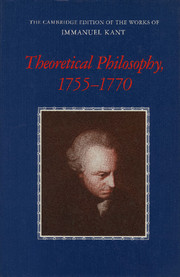Book contents
- Frontmatter
- Contents
- General editors' preface
- Preface
- Guide to abbreviations
- General introduction
- Introductions to the translations
- Résumés of the works
- A NEW ELUCIDATION OF THE FIRST PRINCIPLES OF METAPHYSICAL COGNITION (1755)
- THE EMPLOYMENT IN NATURAL PHILOSOPHY OF METAPHYSICS COMBINED WITH GEOMETRY, OF WHICH SAMPLE I CONTAINS THE PHYSICAL MONADOLOGY (1756)
- Preliminary considerations
- Section 1 Showing that the existence of physical monads is in agreement with geometry
- Section 2 Explaining the most general properties of physical monads
- AN ATTEMPT AT SOME REFLECTIONS ON OPTIMISM (1759)
- THE FALSE SUBTLETY OF THE FOUR SYLLOGISTIC FIGURES (1762)
- THE ONLY POSSIBLE ARGUMENT IN SUPPORT OF A DEMONSTRATION OF THE EXISTENCE OF GOD (1763)
- ATTEMPT TO INTRODUCE THE CONCEPT OF NEGATIVE MAGNITUDES INTO PHILOSOPHY (1763)
- INQUIRY CONCERNING THE DISTINCTNESS OF THE PRINCIPLES OF NATURAL THEOLOGY AND MORALITY (1764)
- M. IMMANUEL KANT'S ANNOUNCEMENT OF THE PROGRAMME OF HIS LECTURES FOR THE WINTER SEMESTER 1765 — 1766 (1765)
- DREAMS OF A SPIRIT-SEER ELUCIDATED BY DREAMS OF METAPHYSICS (1766)
- CONCERNING THE ULTIMATE GROUND OF THE DIFFERENTIATION OF DIRECTIONS IN SPACE (1768)
- ON THE FORM AND PRINCIPLES OF THE SENSIBLE AND THE INTELLIGIBLE WORLD [INAUGURAL DISSERTATION] (1770)
- Factual notes
- Bibliographies of editions and translations
- Glossary
- Biographical-bibliographical sketches of persons mentioned by Kant
- Index
Preliminary considerations
Published online by Cambridge University Press: 18 December 2014
- Frontmatter
- Contents
- General editors' preface
- Preface
- Guide to abbreviations
- General introduction
- Introductions to the translations
- Résumés of the works
- A NEW ELUCIDATION OF THE FIRST PRINCIPLES OF METAPHYSICAL COGNITION (1755)
- THE EMPLOYMENT IN NATURAL PHILOSOPHY OF METAPHYSICS COMBINED WITH GEOMETRY, OF WHICH SAMPLE I CONTAINS THE PHYSICAL MONADOLOGY (1756)
- Preliminary considerations
- Section 1 Showing that the existence of physical monads is in agreement with geometry
- Section 2 Explaining the most general properties of physical monads
- AN ATTEMPT AT SOME REFLECTIONS ON OPTIMISM (1759)
- THE FALSE SUBTLETY OF THE FOUR SYLLOGISTIC FIGURES (1762)
- THE ONLY POSSIBLE ARGUMENT IN SUPPORT OF A DEMONSTRATION OF THE EXISTENCE OF GOD (1763)
- ATTEMPT TO INTRODUCE THE CONCEPT OF NEGATIVE MAGNITUDES INTO PHILOSOPHY (1763)
- INQUIRY CONCERNING THE DISTINCTNESS OF THE PRINCIPLES OF NATURAL THEOLOGY AND MORALITY (1764)
- M. IMMANUEL KANT'S ANNOUNCEMENT OF THE PROGRAMME OF HIS LECTURES FOR THE WINTER SEMESTER 1765 — 1766 (1765)
- DREAMS OF A SPIRIT-SEER ELUCIDATED BY DREAMS OF METAPHYSICS (1766)
- CONCERNING THE ULTIMATE GROUND OF THE DIFFERENTIATION OF DIRECTIONS IN SPACE (1768)
- ON THE FORM AND PRINCIPLES OF THE SENSIBLE AND THE INTELLIGIBLE WORLD [INAUGURAL DISSERTATION] (1770)
- Factual notes
- Bibliographies of editions and translations
- Glossary
- Biographical-bibliographical sketches of persons mentioned by Kant
- Index
Summary
Clear-headed philosophers, who seriously engage in the investigations of nature, unanimously agree, indeed, that punctilious care must be taken lest anything concocted with rashness or with a certain arbitrariness of conjecture should insinuate itself into natural science, or lest anything be vainly undertaken in it without the support of experience and without the mediation of geometry. Certainly, nothing can be thought more useful to philosophy, or more beneficial to it, than this counsel. However, hardly any mortal can advance with a firm step along the straight line of truth without here and there turning aside in one direction or another. For this reason there have been some who have observed this law to such a degree that, in searching out the truth, they have not ventured to commit themselves to the deep sea but have considered it better to hug the coast, only admitting what is immediately revealed by the testimony of the senses. And, certainly, if we follow this sound path, we can exhibit the laws of nature though not the origin and causes of these laws. For those who only hunt out the phenomena of nature are always that far removed from the deeper understanding of the first causes. Nor will they ever attain knowledge of the nature itself of bodies, any more than those who persuade themselves that, by climbing higher and higher up the pinnacles of a mountain they will at last be able to reach out and touch the heavens with their hands.
Metaphysics, therefore, which many say may be properly absent from physics is, in fact, its only support; it alone provides illumination. For bodies consist of parts; it is certainly of no little importance that it be clearly established of which parts, and in what way they are combined together, and whether they fill space merely by the co-presence of their primitive parts or by the reciprocal conflict of their forces.
- Type
- Chapter
- Information
- Theoretical Philosophy, 1755–1770 , pp. 51 - 52Publisher: Cambridge University PressPrint publication year: 1992

